#Virginia Woolf e Vita Sackville-West
Text

em Virginia Woolf & Vita Sackville-West: cartas de amor - Virginia Woolf & Vita Sackville-West
#Virginia Woolf e Vita Sackville-West#Virginia Woolf#Vita Sackville-West#cartas de amor#livros#trechos#books#quotes
14 notes
·
View notes
Text
Creatura carissima, Era molto bella la lettera che hai scritto alla luce delle stelle a mezzanotte. Scrivi sempre a quell’ora, perché il tuo cuore ha bisogno del chiaro di luna per liquefarsi.
Virginia Woolf, lettere a Vita Sackville-West.
#lettere d’amore e desiderio#Virginia Woolf#Virginia Woolf citazioni#lettere#citazioni#citazione#citazioni libri#citazione libro#amore#frasi#Vita Sackville-West#luna#chiaro di luna#corrispondenze
0 notes
Text
Virginia Woolf e Vita Sackville West
Dalla corrispondenza riunita in queste pagine, dove attimi di riflessione profonda si alternano a prese in giro, slanci sensuali e racconti di vicende ordinarie, emerge la voce più vitale e arguta di Virginia Woolf. Nelle lettere, selezionate fra le oltre cinquecento scambiate dal primo incontro alla morte di Virginia, è davvero possibile cogliere, citando il saggio introduttivo di Nadia Fusini,…
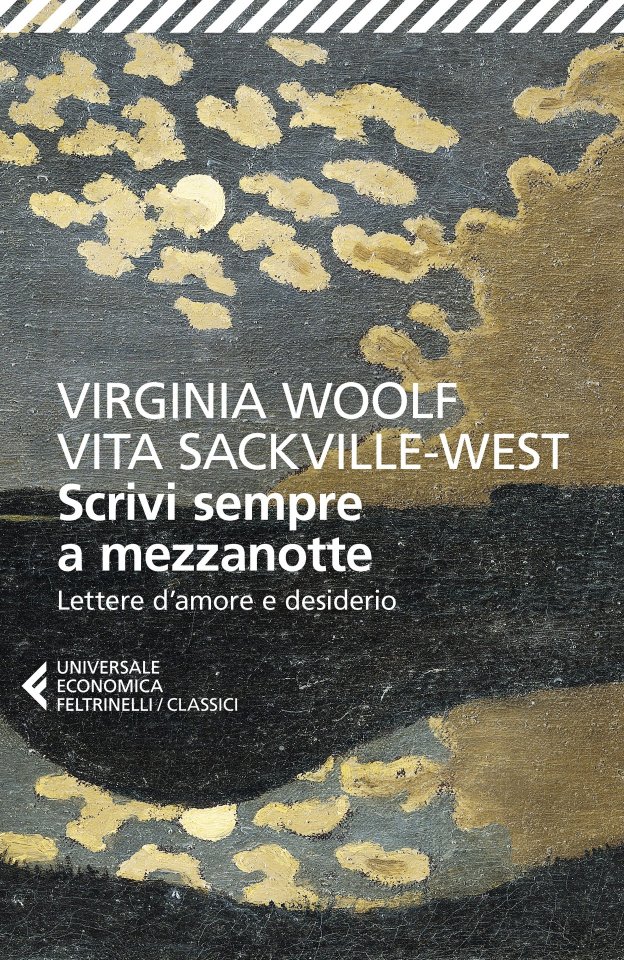
View On WordPress
1 note
·
View note
Text
[La sorella di Shakespeare e altri ritratti di scrittrici][Virginia Woolf]
Dalle scrittrici del Seicento, reali o immaginarie, fino alle "consorelle" sue contemporanee Katherine Mansfield e Vita Sackville-West, Woolf va componendo una vera e propria storia della letteratura inglese scritta da donne
«Come possiamo combinare le parole vecchie in nuove sequenze, così che esse sopravvivano, che creino bellezza, che dicano la verità?» Era questo, per Virginia Woolf, «il problema» del linguaggio letterario. Problema alla cui soluzione si dedicò con la sua riflessione teorica e con la pratica narrativa, alla ricerca di una frase elastica e flessibile, una frase femminile . E allo studio…
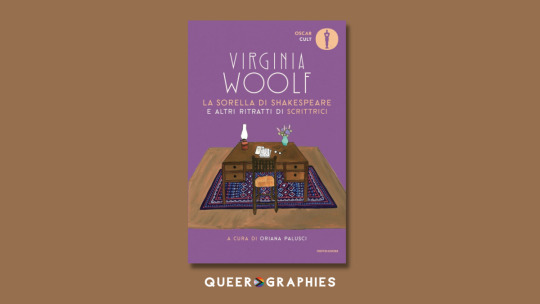
View On WordPress
#2023#critica letteraria#Judith Shakespeare#Katherine Mansfield#La sorella di Shakespeare e altri ritratti di scrittrici#LGBTQ#Mondadori#nonfiction#Oriana Palusci#Saggi#Saggistica#Shakespeare&039;s Sister#UK#Virginia Woolf#Vita Sackville-West
0 notes
Text


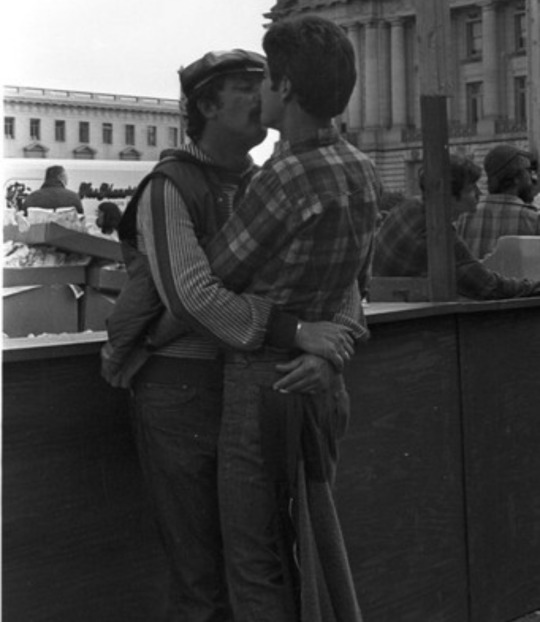
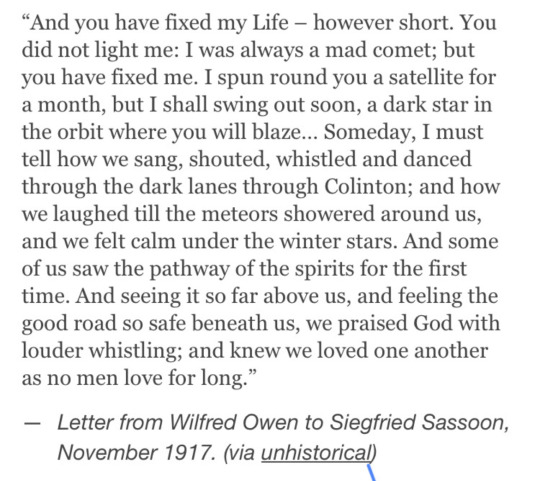
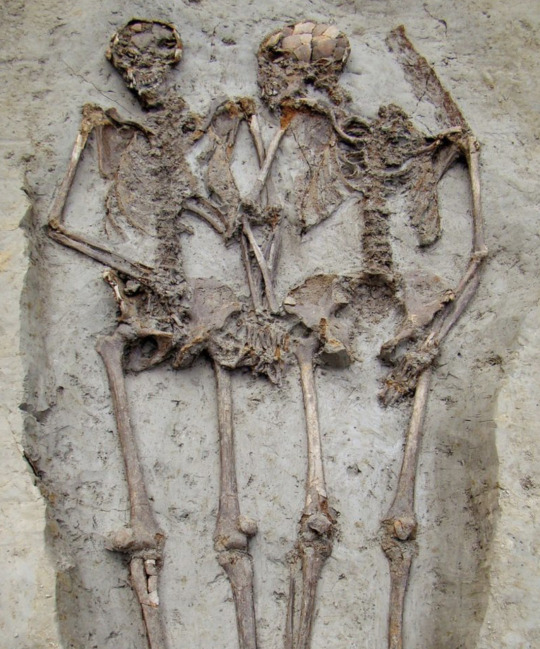
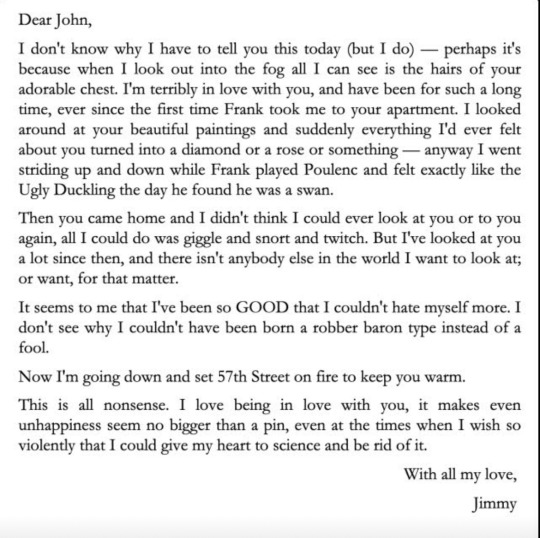


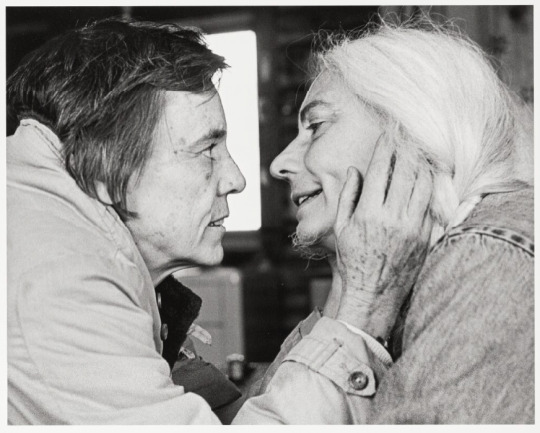

there’s so much love in the world. so much love you could drown in it.
Fred W. McDarrah, outside the Stonewall Inn in June 1969 / queering the map / Marie Ueda, “1977 San Francisco Gay Day Parade” / Wilfred Owen to Siegfried Sassoon / the Lovers of Modena / James Schuyler to John Button / John Boskovich, "Electric Fan (Feel it Motherfuckers): Only Unclaimed Item from the Stephen Earabino Estate" / Vita Sackville-West to Virginia Woolf / Joan E. Biren / Saphho, Fragment 147 / @orpheuslament, “The Second Coming, or Jesus at the Gay Bar”
#the number of times i almost cried making this#like guys there are so many of us. there’s so much history.#we aren’t alone. we’ve never been alone#web weaving#web weave#compilations#comparatives#parallels#words#art#mine#queer#lgbtq+#pride#history#queer history#can you tell i have no idea how to tag this
865 notes
·
View notes
Text
Yielding Against The Waves |Nanami K.

"I just miss you, in a quite simple desperate human way." Vita Sackville-West to Virginia Woolf

Continuation of The Inevitability of Nature. A work of mine which was inspired from @shaisuki 's works, X | X.
all my y/n are afab, fat and of color.
painting of hokusai, the great wave off kanagawa. banner by @cafekitsune.
1.5k words. fluff. smut.
ive been going thru it, so 😁. i teared up when i read the scene with the three of them after i wrote it—

Nanami would have never thought himself to be....needy. But there he is, each time his class ends, he makes you stay, always catching your arm before you could step away from his vicinity.
Burying himself in your embrace, at this point everyone in his class knew that you and him were a thing and how fucking glad you were none of them didn't give a fuck enough for a drama to happen. Shit, if anything, there's always that one student who's always the last before you to leave the room, whichver of them-locks the room for you both. Lucky enough that you were on good terms with them and that Nanami is a respectable and highly regard of a professor after all.
"You have a vacant time right now, come with me to my office," he says, his voice deep on your neck as he holds you tight.
A little and quiet laugh you make while you caress his hair, emitting a low groan from him. "I need to use my vacant time to continue writing my paper." That was almost a lie. You wanted nothing more than to indulge him and even more yourself, but you know you couldn't spoil yourself too much, at least it was a little backup for your pride that you try to keep.
Nanami was beginning to be known of it and he's found it rather endearing. He nuzzles his face on your neck, always liking the way your head lolled against his with your shaking breath leaving you. "You have more than enough days to finish your paper. I'm just asking for an hour or two, angel."
It wasn't that hard for your resolve to crack early when it comes to him. Perhaps that's how it is anyways—love. Even when it's not there yet. It's there.
Still, you try for now. "You talk of an hour or two as if you don't hate wasting time nor you like working past your shift." You remarked playfully.
And how could he not find you even more endearing whenever you manage to make the man break a smirk or even a smile. A soft breath of little laugh escapes him and you feel it on your skin. "For you, angel, for you." He mutters softly before trailing his lips on your neck to your chin, your supple cheeks and to your forehead. "And you could never waste my time."
How could you keep your resolve?
"Alright." That word was the reason you found yourself sitting on your professor's lap in his office. While he rests back heavily on his chair, his eyes closed, as your skirt is bunched up to your waist, his pants just on his knees. Enjoying how good you were for him as you take his cock so well, buried deep in you to warm him up.
Eased you were on him, all the goodness of your weight rest heavy on him, but it was taking all of your restraint to not chase the itch you were aching to burn in your core. Trying to focus on the cold of the room instead of the heat beginning to get thick between you two, sweat rolling down on your skins, the pounding of your heart. Trying to mute it all away as you slowly slid up your grasping palms on his arms to his biceps, wrinkling his dress shirt as you fists on them.
"This is torture, you know." You breathe, having couldn't bear it.
A low rumble thrums from Nanami's chest, his eyes opening slowly to look at you. "One which I enjoy truly." A little tug of his lips showing as he says. While he begins to slid his hands beneath your shirt and gently fondle your fat tummy, the sheet of sweat wetting his skin.
You inhale a hiss softly from the feel of his big hands fondling you against the burning goodness in your cunt swallowing his cock deeply. "I can see that." You hardly spoke. You couldn't find the push to even glare at him.
Nanami laughs a little, keeping his eyes on you. "Angel." He spoke then, breathing it out softly as he grazes his knuckles on your cheek and you lolled against it, your eyes closing for a moment--before you gently hold that wrist of his, opening his closed hand and nestled your cheek onto his palm.
His eyes almost shines. His breath flowing in deep in his mouth.
A reminiscing moment flashes fleetingly in his memories.
"So," Gojo hisses with a low laugh, gently swirling his glass of alcohol. Geto rolls his eyes as he chugs his own, already knowing where the first conversation of their night will lead. "You wanna tell us about her?" He lightly grins.
It has been a month of you and him being together, though with the two of his trusted friends have known of it--nothing has been said from Nanami himself. With the exception of the said best friends or more so lovers gossiping to themselves about it, of course. And not that Nanami didn't know about it anyway.
"What's there to tell about?" Nanami responds simply. He wasn't about to tell them how he's been always wanting and needing of you. The gallery in his phone filled with the pictures you send him randomly, images of your smiles, many of trivial things you come across in your day, and many of him that ones which you take of. The many sections of his wallet tucked with coupons and receipts from the cafes and bakeries you two go to. Each and every pieces he finds and come across has him reminding of you whenever. That it's been difficult to keep himself from smiling to only the thought of you.
It's been difficult to keep it difficult.
Geto laughs as his stubborn lover scowled at Nanami, no doubt that his piercing blue eyes were glaring behind his glasses against Nanami's ever calm ones. Geto pours himself another shot of their bottle of alcohol before speaking up then. "Humor him, Kento. He's been nothing but a pester to me about the subject." He tells, ever amused. "Though of course I'm not saying I ain't curious as well nor it hasn't been entertaining me."
Nanami only tuts his head aside, almost rolling his eyes, not at all surprised about it. His eyes reflects through his glasses against the thick crystallized rock that was filled with scotch, still untouched. It would only make the burn in his heart more hurtful.
It's addicting.
Yet indeed—what is there to say? It seems that it wasn't only his friends he's been avoiding of speaking about his situation.
He was....brave enough to let himself say yes in the beginning, though the more he delve in farther—of course, the remnants of his....fear was still there and surfacing every now and then. But who wouldn't be having needles tearing their seams as they sail through uncharted waters?
As suave he is, Nanami downs his drink. The lovers wait for him to speak with a knowing and fond smile. The coldness of the drink did nothing against the scorch of its essence, and more so your being etched in him. It drags so heavy in his mind. Every fiber, down to the littlest of nerves. It's so good.
Nanami looks down at his now empty glass, tightening his fingers around it as he sees them tremble. The burn in his throat there as he speaks. "She's....the one." God, even his lips were shaky. "She's her. Everything."
He laid down his glass on the table, exhaling gently as deeply from his mouth—the weight in his chest not changing nonetheless. And when he sits back, looking to his friends again, the silence with the three of them so heard; Gojo and Geto had such loving smiles on their faces.
Nanami uncontrollably laughs a breathless smile as he looks down. He was blinding. Ever in awe they were; Gojo had remove his glasses, letting his bared eyes admire his friend, with Geto sliding his palm up on his mouth, tears threatening to seep from the revelation.
They were so happy.
And he still is if not even so much more. Never mind the heated situation you were both in the moment. Nanami, with his other hand from your stomach slowly went to him and up to his chest, all while he held your other and laid it upon his chest.
Your eyes opened when he does, the pound of his heart hitting against your palm, echoing against your own. When you looked at his eyes, you almost gasped—the fingers laying on his chest suddenly twitching. Every little thing, he catches.
Such things he never thought he'd be doing, much less feel—yet there he is; declaring what he was beginning to yearn for. Offering his heart. "For you" You could have cried right then and there. "If you'll have me." He murmured, tangling your fingers together while he keeps you feeling his heart beat.
And with your tears spilling out after all, there comes yourself surrending to the currents.
If you'd have daydreamt of this kind of moment before, you would have laughed in the absurdity of it all.
And you were, but not alone. There you were laughing in breathless tears with him, basking in the love you were both making of your bodies in his office.
Nanami stays in his paradise.
#starr's creations 🌟🍭#jujutsu kaisen#jjk#jjk x reader#jjk smut#jjk fluff#nanami kento#nanami kento smut#nanami x reader#nanami kento fluff#chubby!reader#chubby reader#jujutsu kaisen x plus size reader#anime x chubby reader#jjk anime#jjk manga#jjk nanami#nanami smut
82 notes
·
View notes
Quote
Virginia tesoro, sento che dovrei scriverti una lunga lettera. Una lettera interminabile. Pagine e pagine. Ma c’è troppo da dire. Troppe emozioni e troppa inquietudine. In realtà tutto si riduce a una cosa assolutamente semplice: vorrei che tu fossi qui.
Vita Sackville-West a Virginia Woolf
105 notes
·
View notes
Text
“Un yo que sigue cambiando, es un yo que continúa viviendo”
Virginia Woolf

Adeline Virginia Woolf fue una escritora británica, autora de novelas cuentos, obras teatrales y demás obras literarias, nacida en Londres en enero de 1882, considerada una de las más destacadas figuras del vanguardista modernismo anglosajón del siglo XX y del feminismo internacional.
Primeros años
Su padre era novelista, historiador, ensayista y biógrafo y su madre nació en la India y trabajó de modelo para pintores prerrafaelistas. Ambos habían tenido nupcias previas con hijos de sus anteriores matrimonios.
Virginia recibió clases particulares y de sus propios padres, y a diferencia de sus otros hermanos, con la inmensa biblioteca de los padres aprendieron los clásicos y la literatura inglesa.
Uno de los recuerdos más vívidos de su infancia no fue en la casa de Londres sino en la de St Ives de Cornualles en donde la familia pasaba sus vacaciones, las impresiones de esos viajes y la del faro de Godrevy sirvieron de inspiración para la creación del relato “Al faro”.
Cuando Virginia tenía 13 años, muere su madre repentinamente lo cual fue la causa de sus primeras depresiones, y la muerte de su padre en 1904 aumentaron sus problemas emocionales. Sus crisis nerviosas y periodos recurrentes de depresión según sugieren algunos eruditos fueron incluidos por abusos sexuales que ella y su hermana Vanessa sufrieron a manos de sus medios hermanos.
Estas situaciones hicieron de Virginia al parecer sufriera de lo que hoy se le conoce como trastorno bipolar.
Círculo Bloomsbury
Después de la muerte de su padre, sus hermanos vendieron la casa familiar para mudarse al número 46 de Gordon Square en Bloomsbury, en donde su hermano mayor la convirtió en el centro de reunión de antiguos compañeros universitarios e intelectuales de la talla de E.M. Forster, el economista J.M. Keynes, y los filósofos Bertrand Russell y Ludwig Wittgenstein. Esta formación sería conocida como “el círculo de los Bloomsbury”.
En 1912 a la edad de 30 años se casó con el escritor Leonard Woolf miembro también del círculo Bloomsbury.
Dentro de la ética del círculo Bloomsbury figuraba la no exclusividad sexual, por lo que durante la mayor parte de los años 20, Virginia sostuvo una relación con la escritora Vita Sackville-West.
Woolf comenzó a escribir profesionalmente en 1905, y su primera novela “Fin de viaje” en 1915 vió la luz apoyada por la editorial de su medio hermano.
Tras la publicación de “La señora Dalloway” y “Al faro”, los críticos comenzaron a elogiar su originalidad literaria, cuya maestría técnica y el afán experimental de la autora, introducida además en la prosa novelística un estilo y unas imágenes propias de la poesía.
Su legado
Wolf experimentó con especial interés con el tiempo narrativo, tanto en su aspecto individual como en el flujo de variaciones en la conciencia del personaje.
En Las Olas (1931), presenta un flujo de conciencia de seis personajes distintos, es decir, la corriente preconsciente de ideas tal como aparece en la mente, a diferencia del lógico y bien trabajado monólogo tradicional con lo que crea un ambiente de poema en prosa.
Wolf publicó novelas y ensayos con éxito tanto de crítica como de público, y fue catalogada como una de las grandes novelistas del siglo XX y aunque su reputación declinó después de la Segunda Guerra Mundial, recuperó su auge con la crítica feminista de los años 70.
Últimos días
Después de terminar el manuscrito de su última novela “Entre Actos”, Wolf cayó en una profunda depresión. Su trastorno bipolar, el estallido de la Segunda Guerra Mundial y la destrucción de su casa durante los bombardeos, empeoraron su condición hasta que se vió incapaz de trabajar.
El 28 de marzo de 1941, Woolf se suicidó, llenó su abrigo con piedras en los bolsillos y se lanzó al río Ouse, cerca de su hogar donde se ahogó.
Woolf escribió una nota llena de amor hacia su esposo, describiendo lo difícil de su condición y su incapacidad para seguir luchando, le agradece todo lo que había hecho por ella.
Sus restos fueron incinerados y enterrados por su esposo bajo un árbol en Rodmell Sussex.
Fuente: Wikipedia.
#citas de reflexion#frases de reflexion#citas de la vida#citas de escritores#escritores#frases de escritores#notas de vida#virginia woolf#literature
11 notes
·
View notes
Text
P.S. Vita Sackville-West para Virginia Woolf — 1927:
Para mim é gritante: sinto ainda mais saudades de você do que poderia imaginar; e estava preparada para sentir muitas.
— Red, White and Royal Blue.
19 notes
·
View notes
Text
"Mi sono ridotta a una cosa che desidera Virginia. Ho scritto una bellissima lettera per te in una notte insonne fatta di incubi, e mi sono accorta che tutto è andato: mi manchi, mi manchi soltanto, in modo semplice, quieto, umano, disperato. Tu, in tutte le tue lettere, non avresti mai scritto una frase elementare come questa. Eppure, credo tu possa essere sensibile a questo piccolo varco. Mi manchi ancora di più di quanto avrei potuto credere e questa lettera è in realtà solo un gemito di dolore. Incredibile è quanto tu per me sia diventata essenziale. Suppongo tu sia abituata a persone che ti dicono queste cose. Accidenti a te, creatura viziata; non mi farò amare di più, buttandomi via così – Ma, oh mia cara, non posso essere furba e scostante con te: ti amo troppo per questo. Troppo sinceramente. Non hai idea di quanto scostante posso essere con le persone che non amo. Ne ho fatto un’arte raffinata. Ma tu hai distrutto le mie difese. E sinceramente non mi dispiace."
— Vita Sackville-West, lettera a Virginia Woolf
27 notes
·
View notes
Note
hey babie, ive been reading quotes from virginia woolf and vita sackville west's love letters and, upon reading this particular quote, i could not, would not (should not?) stop thinking about dbf! joel, like this is how he feels about reader, these words, these feelings, the fear, the affection, the l-o-v-e, the holding back, everything, so i had to come here and beg you to feel it all with me! the quote is:
"Yes yes yes I do like you. I am afraid to write the stronger word."
btw it needs to be said that the only reason they are constantly on my mind is because of you. you created this world and i am in awe of your talent and the way your beautiful mind comes up with all these scenarios, im in awe of your way with words and afraid of the power you now have over me as a result of all of that. thank you, thank you, thank you for sharing your gift with us (and doing it FOR FREE?? mwah youresogreatneverstop)
i have sat staring at this all day. not you being reminded of this little series by the words of virginia fucking woolf (screams)
i love that quote. it's so simple and it hits so hard. all the things you said, non - the attempt to contain something uncontainable, the fear of admitting it even to themselves, thinking they can get by just constantly acknowledging this small piece of it and holding back on how they actually feel.
all this trying to keep it at a level which feels manageable, all the while knowing that somewhere beneath the surface there's a very unmanageable level of feeling and affection and love ready to burst through at any time.
thank you for reading and thank you for sending this. love you love you love you
14 notes
·
View notes
Text

Virginia Woolf & Vita Sackville-West: cartas de amor - Virginia Woolf & Vita Sackville-West
#Virginia Woolf e Vita Sackville-West#Virginia Woolf#Vita Sackville-West#cartas de amor#livros#trechos#books#quotes
7 notes
·
View notes
Text
Stanotte avevo composto per te una lettera bellissima, nelle ore insonni, piene di incubi, ma è tutta sparita: mi manchi e basta, in un modo piuttosto semplice, disperato, umano.
Vita Sackville-West, lettera a Virginia Woolf
#Virginia Woolf#citazioni#citazione#lettere#corrispondenze#mancanza#amore#citazioni libri#citazione libro#lettere d’amore e desiderio#frasi#sera#notte
21 notes
·
View notes
Text
The Lady Orlando
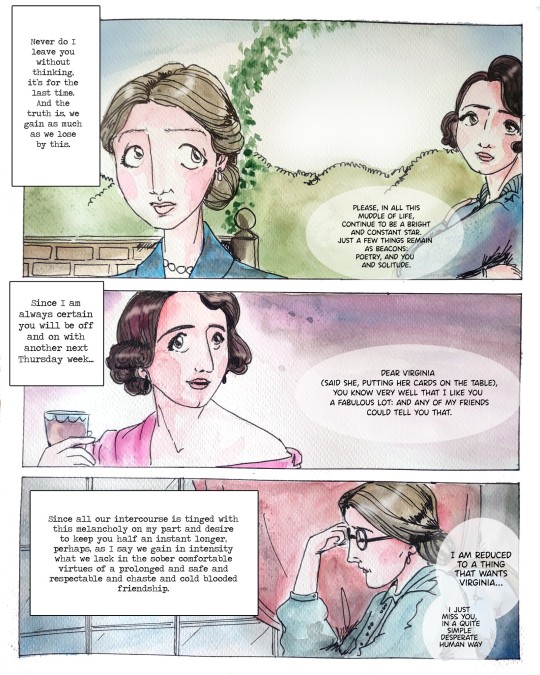
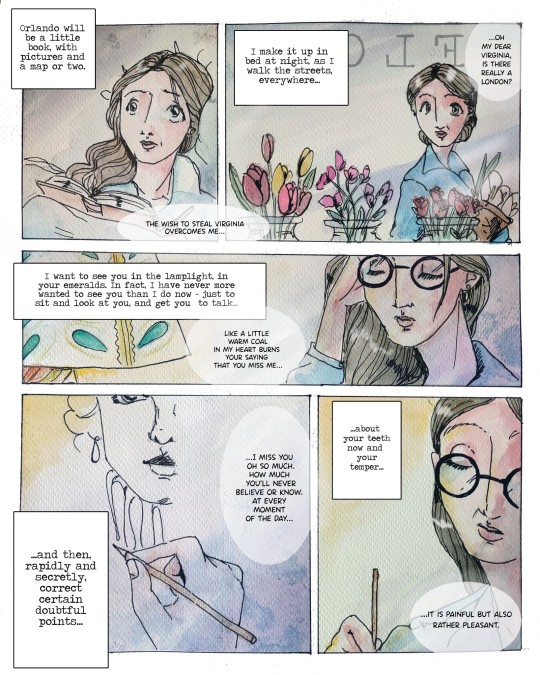
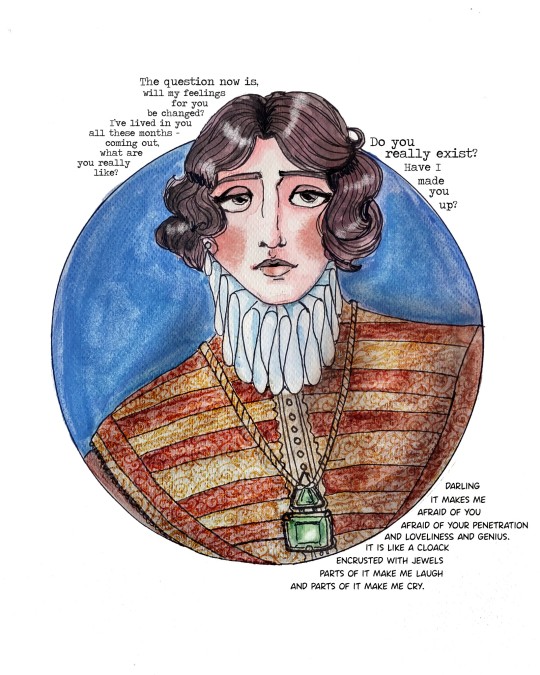
Orlando è così bello che a volte mi chiedo come sia possibile che esista una cosa del genere a questo mondo. Come è possibile che davvero una persona abbia dentro la testa e nel cuore così tanta bellezza, io non lo so. Mi fa essere felice perché riesco a vederla, la bellezza, è per me, e sono anche inspiegabilmente triste al pensiero che il resto del mondo non stia leggendo Orlando, in questo preciso istante. Per me Mrs Dalloway era stato memorabile. ricordo di averlo letto in metro, nei pomeriggi di ritorno dall'Università, e intanto ascoltavo Antony and the Johnsons. è stata l'unica volta che in vita mia sono riuscita a leggere qualcosa ascoltando della musica. E questo perché Virginia Woolf e quella musica si conoscono, parlano la stessa identica lingua. Quella musica è così trasparente, così profonda che mi fa pensare spesso alla morte. E così anche Virginia Woolf. Ci sono tantissimi pensieri dentro Mrs Dalloway che vanno lì senza cercare scuse, senza mezzi termini. È bellissimo. Bellissimo ma vertiginoso. E Orlando lo scrive subito dopo Mrs Dalloway: questo mi ha fatto pensare, quando l'ho scoperto, che tra i libri di uno stesso autore esiste una relazione di parentela che è inversa rispetto a quella che c'è tra i figli di una stessa madre: i primi nati non sono i più grandi; i figli maggiori sono gli ultimi partoriti dalla mente dello scrittore. per capirci, Orlando è il fratello più grande di Mrs Dalloway, e questa è una garanzia di buona condotta nel ragazzo, lui è presumibilmente maturo, assennato, serio almeno quanto la sorella, probabilmente lo è anche di più. E invece, quando lo conosci bene, vedi subito che Orlando è sbarazzino come un fratello minore. Con lui Virginia Woolf si è voluta concedere una "writer's holiday": e si sente tutto, perché lei se la concede gloriosamente. Questa è una vacanza in un hotel di cinque stelle, e l'hotel si chiama Knole. In vacanza, si sa, uno ci va spensierato e leggero, ma Virginia Woolf non lascia niente al caso, tutto è preparato e organizzato nel minimo dettaglio, prima ancora che per se stessa, per la sua compagna di viaggio, Vita. Perché in fondo questa non è solo una vacanza da scrittore, no: è una lettera d'amore. La più lunga lettera d'amore della letteratura. Ogni parola in questo libro è una parola d'amore. E di un amore invidiabile, almeno io lo invidio: perché è fatto proprio di letteratura, costruito con pezzi di quella, raccolti con cura da ogni epoca passata. E a leggere bene, è un amore fatto di poesia, ecco in realtà perché lo invidio. Poesia, proprio come nell'incipit di quella lettera bellissima in cui Virginia annuncia a Vita la sua intenzione di scrivere questo romanzo. Una poesia travestita da lettera, ché a guardar bene quelli a me sembrano proprio pentametri
Never do i leave you without thinking/
it's for the last time. and the Truth Is,/
we gain as much as we lose by this./
E Orlando è una poesia che trasuda arguzia da ogni poro, ed è travestita da narrativa che è travestita da biografia. Ogni idea dentro questo libro è una trappola, fin troppo intelligente, per far capitolare Vita: è un incallito tentativo di compiacerla, di sedurla con le parole, un corteggiamento letterario, un glorioso e velleitario occhiolino: vuole farla ridere, vuole farla innamorare. Difatti per tutto il tempo si ha la netta sensazione di essercisi seduti per sbaglio ad un tavolino che era prenotato per due. E quelle due del tavolino si guardano negli occhi e, appunto, ridono: tu se vuoi puoi pure sederti, tanto loro non ti sentono proprio.
Virginia Woolf inizia a scrivere la sua biografia proprio quando Vita Sackville-West sembra più incostante, le volta le spalle, passeggia con altre donne. Allora deve riprendersela, allora l'invenzione deve essere altissima, deve farla cadere ai suoi piedi, deve lasciarla senza parole con le uniche armi che ha, lei che non sa neanche riconoscere il davanti di un abito dal dietro: allora le regala il tempo, e le regala l'ironia. Le regala un corpo da uomo, e un paio di calze nere perché possa sfoggiarci dentro le sue gambe perfette, le più belle gambe su cui un nobiluomo si sia mai messo in piedi; le regala una vecchia regina Elisabetta, infatuata di lui; le regala una risalita del Tamigi di fronte alla nuovissima Londra di Wren; le regala le coffee houses appena fondate, e le regala i poeti. I poeti sono il suo più grande asso nella manica: sono le sue parole d'amore più irresistibili, e Virginia Woolf lo sa perfettamente. Perché è impossibile che Vita non si sciolga al pensiero di aver cenato con Pope, pranzato con Addison, e preso il tè con Swift. Meglio ancora: i poeti glieli porta dentro casa, e lì dentro Vita può finalmente ridere anche di loro, fino quasi a vergognarsene, può vederli in tutti i loro miseri difetti e in tutti i loro piccoli limiti. Può vederli umani insomma, può vederli davvero. E allo stesso tempo, mentre è così impegnata a disegnare Vita, a dirle quanto è bella, a dimostrarle quanto a fondo la conosce, quanto può riuscire a compiacerla, Virginia Woolf si sta spogliando davanti alla signora Orlando, si sta arrendendo a lei, senza pudore. Il suo amore per il 700 inglese è una confessione spudorata. È seducente persino sentirla descrivere il passaggio di secolo, l'umidità che si arrampica su per le pareti delle case insieme alle rampicanti di edera, le barbe che crescono, i tappeti che avanzano, che conquistano ancora una stanza: i matrimoni che si stringono al freddo del nuovo secolo e la conseguente, inevitabile nascita dell'impero britannico. È un libro intimo: è una conversazione a un tavolo per due.
Verso la fine di questa vacanza nel tempo, sento distintamente che Virginia Woolf comincia a prepararsi per il rientro a casa. Gli ultimi capitoli del libro sono più impegnativi, sembra quasi di sentirla ogni tanto tirare un colpetto di tosse, a far uscire la sua voce di sempre, quella della signora Dalloway, la sorella minore ma più assennata. Con quella stessa voce raccoglie finalmente tutti i fili seminati per la sua biografia fittizia e, senza curarsi di te che stai lì al tavolino, li mette in mano alla sua interlocutrice, la vera questione di questa lettera d'amore: cara Vita, ha forse senso questo mio rincorrere la tua bellezza nei secoli? esiste davvero la poesia? ha qualcosa a che vedere poi con la vita? e dimmi, Dryden può mai essere una parola d'amore? Avvicinati ancora una volta, ascolta: Dryden.
La questione era già perfettamente formulata nella meravigliosa lettera che annunciava il concepimento di Orlando: alla vigilia della scrittura, quando ancora il libro è quasi solo un'idea. Questo è un momento mitico, come quando per la prima volta si incontrano gli sguardi di due amanti della leggenda. Sto per scrivere Orlando perché non voglio più lasciarti: never do I leave you without thinking, It is for the last time. Prima ancora che Orlando abbia iniziato la sua gestazione, molto prima che abbia aperto gli occhi sul mondo, la domanda c'è già, rotonda, sbigottita: come faccio a restare con te? come faccio a tenerti per sempre? come faccio a evitare che questa sia la mia ultima lettera? come può la poesia vincere la vita, o meglio, vincere la morte?
La risposta io credo sia in quella cassaforte dove, allo scoppiare della guerra, Vita aveva nascosto i suoi smeraldi insieme al piu inestimabile dei tesori in suo possesso: il manoscritto di Orlando, che Virginia Woolf le aveva fatto recapitare a casa un giorno prima della pubblicazione del libro per il resto del mondo. Loro due sono ancora sedute a quel tavolo, e lo saranno nei secoli, a ripetersi tre semplici parole d'amore:
Addison, Dryden, Pope.
E a guardare bene, Vita Sackville-West ride e piange allo stesso tempo:
Never do i leave you without thinking, it's for the last time.
#virginia woolf#vita sackville west#orlando#literature#poetry#poesia#illustration#watercolor#watercolour art
7 notes
·
View notes
Text
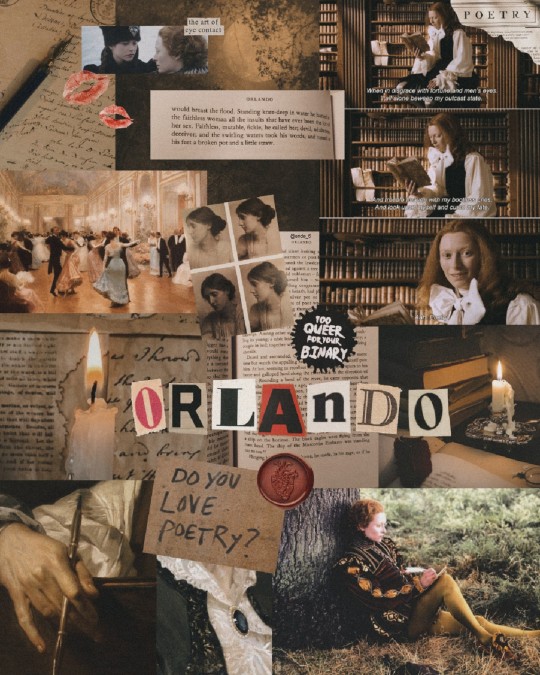
Orlando - Virginia Woolf ⭐⭐⭐⭐⭐
Orlando: una biografía es, sin duda alguna, una obra totalmente adelantada a su época. Publicada en 1928 e inspirada en la vida de Vita Sackville-West, la novia de Virginia Woolf.
Con la excusa de contarnos sobre la vida de este personaje llamado Orlando, que vive cinco siglos, primero como hombre y después como mujer; Virginia Woolf no solo nos cuenta una historia entretenida, sino que habla sobre temas tales como la identidad de género, la bisexualidad, transexualidad, el fluir entre géneros, la sexualidad femenina, el rol de la mujer en la sociedad, los roles de género, el amor, entre otros temas.
La reflexión sobre estos tópicos y las críticas sociales son el punto fuerte de la novela. Lo que me parece destacable es que todo es tratado con respeto, pero también de una forma irónica y muy divertida, parodiando al género biográfico.
Respecto a los elementos fantásticos en la historia, me pareció muy creativa la forma en la cual se relata tan sutilmente el paso del tiempo.
En síntesis, aunque es verdad que la novela se enfoca principalmente en la gente queer y las mujeres, esta obra nos interpela a todos como sociedad, por eso pienso que es menester dar visibilidad a este tipo de relatos. Orlando de Virginia Woolf es una novela que trata temas súper actuales desde un enfoque muy interesante y creativo, es entretenida, relativamente corta y fácil de leer; por eso considero que es una excelente historia para comenzar a leer sobre feminismo y sexualidad.
¡Súper recomendada!
#orlando#virginia woolf#book blog#frases#aesthetic#libros#dark academia#dark academia edit#dark edits#lgbtq community#lgbtq#booksbooksbooks#literatura#review#reseña
6 notes
·
View notes
Photo
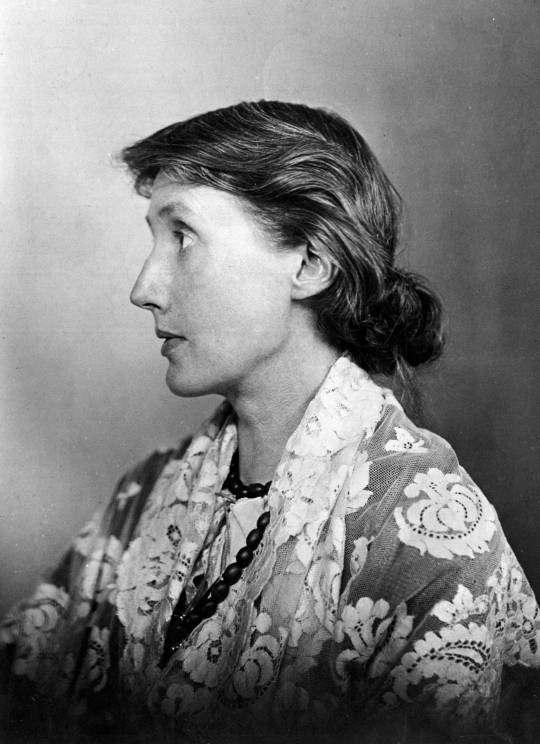
Virginia Woolf (1882–1941)
A prominent modernist writer best known for her novels, essays, diaries, and letters, and for her use of the stream-of-consciousness technique to weave the memories and interior thoughts of her characters into the narrative. As a result, her work is characterized by vibrant portraits of its main characters, and in particular for its nuanced and deep portrayals of the inner lives of women. Woolf wrote about the rapidly shifting technologies and gender roles of the time in which she lived. She also emphasized moving beyond framing experience in terms of binary oppositions, advocating instead for a “perpetual marriage of granite and rainbow” (“The New Biography”) and bringing a more imaginative approach to fiction.
In particular, Virginia Woolf was interested in the idea of biography, and of exploring “an ordinary mind on an ordinary day” (from “Modern Fiction”) rather than people deemed “great” by society. In her essay “The Art of Biography”, Woolf wrote:
“The question now inevitably asks itself, whether the lives of great men only should be recorded. Is not anyone who has lived a life, and left a record of that life, worthy of biography – the failures as well as the successes, the humble as well as the illustrious.”
She ran Hogarth Press, a publishing house, with her husband Leonard Woolf, publishing writers like T S Eliot, Sigmund Freud, Katherine Mansfield, E M Forster, and of course the Woolfs themselves. The couple’s house was a hub for lots of intellectual activity, namely by the Bloomsbury Group, a group of artists, writers, and intellectuals who were massively influential in the early 20th century.
In 1922, after the publication of her novel Jacob’s Room, the first of her more nontraditional works, she wrote in her diary: “There’s no doubt in my mind that I have found out how to begin (at forty) to say something in my own voice, and that interests me so that I feel I can go ahead without praise.” Later that year, she notes further, “At forty I am beginning to learn the mechanism of my own brain – how to get the greatest amount of pleasure and work out of it.” Virginia’s most well-known novels are Mrs. Dalloway (1925) and To The Lighthouse (1927), and one of her best-known essays is “A Room of One’s Own” (1929), a key work of feminist literary criticism that imagines a sister for William Shakespeare and examines the limitations placed on women who make art in comparison to men. She also originated the concept of the “Angel of the House” in her essay “Professions for Women”, a confined figure who must stay at home, perpetuate womanly virtues, and sacrifice for the men of the household; it is thought that this relates to her difficult upbringing, with a father who was both a famous writer and also abusive to Virginia and her siblings.
In terms of Virginia’s personal life, she struggled with depression throughout her life, experiencing multiple nervous breakdowns and periods of deep grief related to the death of her parents and brother. Virginia experienced romantic attachments to several women in her late teens and early twenties, including Madge Vaughan and Violet Dickinson (about whom Virginia wrote in her diary in 1922: “is love the word for these strange deep ancient affections, which began in youth and have got mixed up with so many important things?”). She met and began an affair with Vita Sackville-West around 1924, which eventually culminated in Orlando, a Biography (1928), frequently referred to as “the longest love letter in the English language.”
Ultimately, as World War II’s threat to life in England grew, Woolf found herself unable to write any longer and took her own life in March, 1941. She left her husband, Leonard, this message: “I owe all my happiness in life to you. You have been so perfectly good.”
4 notes
·
View notes